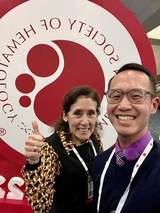
Years 2 and 3 of fellowship (and year 4 if completing ARP training) are largely devoted to research (80%), with a reduced proportion of time allotted to clinical care. All types of research are valued: basic, translational and clinical. Within those domains, trainees work in diverse content areas: fundamental biology of hematologic and malignant disorders, drug and therapeutics development, outcomes, disparities, and health policy, among others. Many enter wet-labs and/or computational groups to pursue basic and translational research. Fellows interested in clinical research usually pursue a master’s degree to supplement their learning and these include the MSCE (Clinical Epidemiology and Biostatistics), MSHP (Health Policy), MSTR (Translational Research), MS in Bioethics and MS in Clinical Pharmacology.
All fellows create a tailored mentoring team to oversee their research training with programmatic input (Scholarly Oversight Committee). This includes a primary mentor and secondary mentors and advisors, both within and outside of the Divisions of Hematology and Oncology. We invite matched fellows to visit our campus in person or virtually prior to beginning their fellowship to meet with potential mentors, and we run an open campus for this purpose. Trainees can work with PIs within the Divisions of Hematology or Oncology at CHOP, outside of these divisions, or in laboratories at the University of Pennsylvania or the Wistar Institute. Those training outside of our divisions are required to have a mentor within the divisions to help oversee their professional development.

Throughout the research years we hold a monthly “Research Calls” curriculum. Year 1 calls (during the clinical year) review best practices for selecting a research pathway, project and mentor, and help clinical research-interested trainees prepare for MS program applications. The upper years calls focus on making a successful research transition, scholarship deliverables, and sharing experiences related to research training. This process is consolidated around a daylong Fall Research Retreat that addresses research topics: grant writing and submission basics, being a good mentor and a good mentee, and career development and professional transitions.
Our supportive environment, team mentoring, programmatic oversight, and vertical and horizontal peer mentoring are responsible for the tremendous successes of our trainees in securing competitive grants during fellowship and beyond.